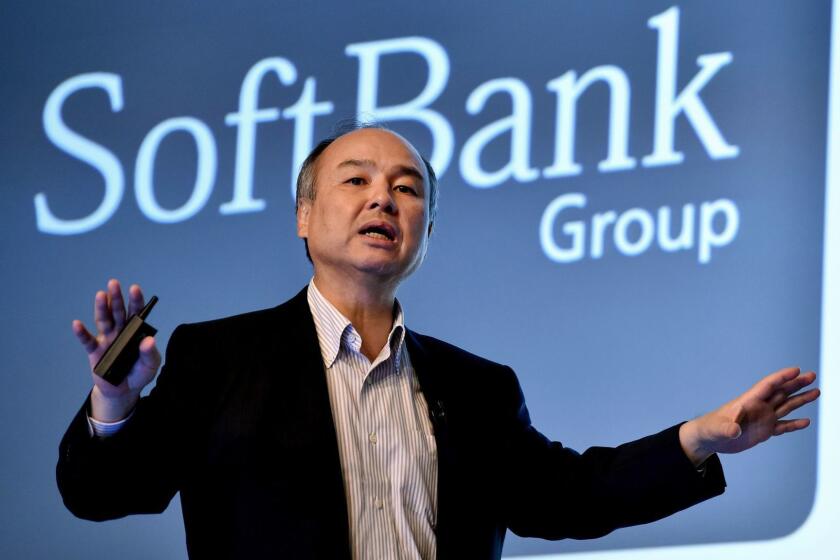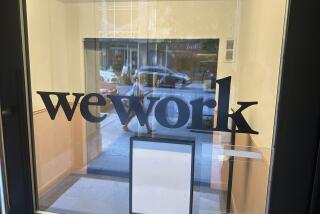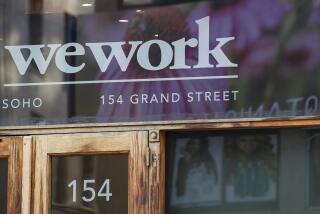SoftBank takes control of WeWork as part of bailout; Adam Neumann leaves board

SoftBank Group Corp. is taking control of beleaguered WeWork, part of a rescue financing plan that will see former Chief Executive Adam Neumann sever most of his remaining ties with the company he co-founded, according to people familiar with the matter.
The eleventh-hour deal throws a lifeline to WeWork parent We Co., which was on the verge of running out of cash after a failed public offering in September. By salvaging one of its biggest investments, SoftBank will give a second chance to WeWork to start over under new ownership. It also tosses a buoy to Neumann, who will give up his board seat and walk away with as much as $1.2 billion as well as a $500-million credit line from SoftBank, after it pushed him out as CEO last month.
Neumann is allowed to sell slightly less than $1 billion of stock to the Japanese conglomerate as part of the deal, said the people, who asked to remain anonymous because the agreement hasn’t been announced. He’ll remain as a board observer and can assign two board seats, one of the people said. Neumann will also get a roughly $185-million consulting fee. His net worth would still be at least $1 billion, according to calculations by the Bloomberg Billionaires Index.
SoftBank is offering to take over WeWork, buying as much as $3 billion of stock from existing shareholders and providing $5 billion in debt financing.
WeWork chose the offer from SoftBank, which already owns about one-third of the company, over a competing proposal from JPMorgan Chase & Co. The deal, which values the office-sharing start-up at about $8 billion before any new capital from SoftBank, marks a shocking fall from grace for a business emblematic of the latest tech boom that had been valued as recently as January at $47 billion.
As part of SoftBank’s plan, one of its executives, Marcelo Claure, will take over as chairman of WeWork’s board, one of the people said. WeWork appointed Artie Minson and Sebastian Gunningham as co-CEOs last month after investors pushed back against the IPO.
SoftBank and JPMorgan declined to comment. WeWork couldn’t immediately be reached. Dow Jones earlier reported details of the deal.
SoftBank’s stock purchase from Neumann is part of a broader offer to buy as much as $3 billion from existing shareholders, one of the people familiar with the matter said. The $500-million credit line for Neumann —of which roughly $395 million is drawn — will be secured by some of his stock. And a $500-million loan to Neumann extended by JPMorgan, UBS and Credit Suisse will be repaid, one of the people said. When Neumann stepped down from the CEO role, it triggered terms of the loan that would have put him in technical default, according to a person familiar with the matter.
JPMorgan had been pitching a $5-billion debt package for WeWork. Last week, the company had been leaning toward the bank’s plan over SoftBank’s because it wouldn’t dilute existing shares or force the start-up to cede control.
But disagreements over the company’s valuation — JPMorgan’s plan had pegged WeWork at about $5 billion — pushed the company toward SoftBank, which was willing to increase its equity stake and provide a payout to Neumann, according to a person familiar with the situation.
SoftBank is WeWork’s largest investor and had committed more than $10 billion to the company even before the bailout. As its estimated valuation cratered, WeWork last month ousted Neumann and, eventually, pulled its IPO paperwork.
The canceled public offering left WeWork, which lost $900 million in the first half of the year, without a crucial source of funding: a $6-billion loan that had been contingent on a successful entrance into the stock market.
SoftBank’s bailout of WeWork comes at a particularly sensitive time for the investment powerhouse run by billionaire Masayoshi Son. SoftBank is looking to raise money for a second version of its Vision Fund, a $100-billion technology-focused fund that reshaped the way the Silicon Valley start-up world works by dint of its sheer size. Today, investors are expressing hesitance about the fund’s second iteration, which SoftBank hopes to make even bigger than the first.
In a recent interview with Nikkei Business magazine, Son said he was “embarrassed and impatient” with his recent track record. WeWork is not the only big bet for SoftBank that went south. It was also the largest investor in Uber Technologies Inc., whose stock price is down about a third since its May IPO.
On a call Monday, Son apologized to investors in the first Vision Fund, which injected capital into WeWork at a valuation of north of $21 billion in 2017, according to a person briefed on the matter. Representatives for SoftBank and the Vision Fund declined to comment.
Despite the bailout, WeWork still has a long way to go to deal with the repercussions of its growth-at-all-costs strategy. It has become the biggest private office tenant in cities including New York and London and had lease obligations worth more than $47 billion as of June, according to a regulatory filing last month.
In the filing, WeWork said it considers only 30% of its space “mature,” which typically means the sales and marketing process is complete and the property is generating steady revenue. The company still faces costs associated with renovating work spaces it has already leased, which could approach $1 billion based on data in the filing.
Landlords and tenants have become cautious when dealing with the company: Google has walked away from a potential Toronto lease after months of negotiations, and landlords are reaching out to WeWork rivals to see if they will take over WeWork leases or buildings if necessary. A project in Seattle was also recently scrapped.
Bloomberg writers Natalie Wong and Patrick Clark contributed to this report.
More to Read
Inside the business of entertainment
The Wide Shot brings you news, analysis and insights on everything from streaming wars to production — and what it all means for the future.
You may occasionally receive promotional content from the Los Angeles Times.











